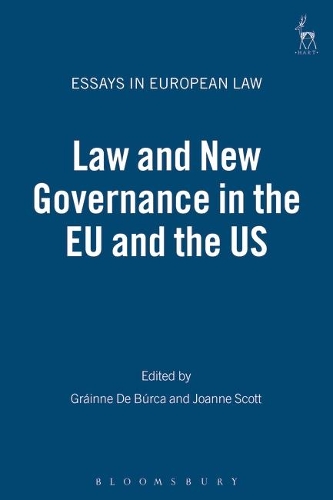
Law and New Governance in the EU and the US
(Paperback)
Publishing Details
Law and New Governance in the EU and the US
By (Author) Grinne de Brca
Edited by Joanne Scott
Bloomsbury Publishing PLC
Hart Publishing
26th April 2006
United Kingdom
Classifications
Professional and Scholarly
Non Fiction
342.02
Physical Properties
Paperback
440
Width 156mm, Height 234mm, Spine 22mm
Description
"New" approaches to governance have attracted significant scholarly attention in recent years. Commentators on both sides of the Atlantic have identified, charted and evaluated the rise and spread of forms of governance, forms which seem to differ from previous regulatory and legal paradigms. In Europe, the emergence of the Open Method of Coordination has provided a focal point for new governance studies. In the US, scholarship on issues such as collaborative problem-solving, democratic experimentalism, and problem-solving courts exemplify the interest in similar developments. Hitherto there has been little reflection on the legal and constitutional dimension of the modes and forms of governance being appraised. This book, presenting the results of an international research project, demonstrates considerable diversity in terms of the policy sectors and subject areas under examination, ranging across a wide range of policy areas, including the environment, education, anti-discrimination, food safety and many others. While some chapters concentrate on the operation of new governance mechanisms in a federal and multilevel context and others look at the relationship between public and private mechanisms and settings, what all the contributors share in common is the pursuit of effective mechanisms for addressing complex social problems, and the challenges they raise for our understanding of law and constitutionalism, and of legal and constitutional values.
Reviews
The volume is useful reading for an academic, professional and policy audience. Each of the essays is well-organized internally, with clear and appealing structures...an exciting and well-timed contribution to the growing legal scholarship on the relationships between law and new governance. -- Mark Flear * Common Market Law Review, Volume 44, issue 6 *
This book is an impressive exercise in comparative law...the real strength of this book is the case studies.The conceptual chapters would stand on their own as interesting academic contributions to the subject. -- John Townsend * King's Law Journal, Volume 18, Issue 1 *
This is..a book with a subject-matter that is highly variedIt also provides a rich source of ideas and references to further reflective literature, so that the individual chapters will be extremely useful for those working in the cognate fields concerned...the work provokes a host of questions and will undoubtedly fuel many further enquires. -- Evelyn Ellis * Public Law *
The meeting in this book of academic experts from either side of the Atlantic provides a range of essays based on real cases studied, examined from different backgrounds - thereby enabling readers to gain better understanding of this new, evasive form of governance which is at work in the process of evolving the European Union. -- Frederik Ronse * European Library, No 9262/699 *
an important contribution to a rapidly growing scholarly, administrative, political and economic debateThe strength of this collection are its contributors, who have already shaped some key concepts of the debate and brought forth some of the most influential criticism of recent developmentsthis book challenges our understanding of law and constitutionalism in the EU and the US, and it can well serve as a starting and focal point for further and deeper discourse on new governance. -- Christoph Konrath * The Law and Politics Book Review, Vol 16, No 11 *
...this volume represents a cogent attempt to bring a big-picture perspective to a vast number of discrete developments within the EU... * International and Comparative Law Quarterly *
Author Bio
Grinne de Brca is Professor of Law at Fordham Law School, New York. Joanne Scott is Professor of European Law at University College, London.
